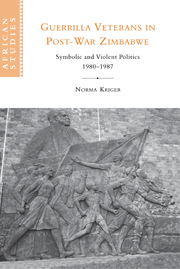Book contents
- Frontmatter
- Contents
- List of tables
- Acknowledgments
- Chronology (1889–1980)
- List of abbreviations
- Map
- 1 Introduction
- 2 The peace settlement
- 3 The assembly phase
- 4 Military integration
- 5 Employment programs for the demobilized
- 6 Conclusion
- Epilogue: the past in the present
- Appendix: The ruling party's attempts to withdraw ex-combatants' special status and ex-combatants' responses, 1988–1997
- Notes
- References
- List of pseudonyms used in the text
- Index
- Cambridge Cultural Social Studies
3 - The assembly phase
Published online by Cambridge University Press: 22 September 2009
- Frontmatter
- Contents
- List of tables
- Acknowledgments
- Chronology (1889–1980)
- List of abbreviations
- Map
- 1 Introduction
- 2 The peace settlement
- 3 The assembly phase
- 4 Military integration
- 5 Employment programs for the demobilized
- 6 Conclusion
- Epilogue: the past in the present
- Appendix: The ruling party's attempts to withdraw ex-combatants' special status and ex-combatants' responses, 1988–1997
- Notes
- References
- List of pseudonyms used in the text
- Index
- Cambridge Cultural Social Studies
Summary
The guerrillas were both assets and threats to the new regime as it sought to establish control of the armed forces and to end multiple sovereignty. To build and legitimate its power in the assembly phase, which coexisted with military integration, the ruling party pursued dual and contradictory strategies. It treated the two guerrilla armies as the de facto equals of Rhodesian soldiers. Simultaneously, the ruling party systematically favored ZANLA over ZIPRA guerrillas in a strategy that came to dominate. The guerrillas sought to enhance their privileges and power, relying on violence, fraud, and appeals to their war contribution. The ruling party often collaborated with the guerrillas but came into sharp conflict with them when it imposed disarmament and compulsory demobilization in abrupt policy reversals. At the end of the assembly phase, the demobilized guerrillas were established as a privileged group, largely stripped of their armed power but with a potent resource in their symbolic status as liberators and fighters. The ruling party had created a single army from the three warring forces and had thus removed a major threat to its survival. But in the process of forging a single army, the party had supported guerrilla violence and fraud and guerrilla challenges to the constitutional forces of law and order. War-time mass military mobilization was neither an unambiguous asset to the post-war revolutionary regime, as Theda Skocpol has proposed, nor an unambiguous threat, as peace-building studies tend to assume.
- Type
- Chapter
- Information
- Guerrilla Veterans in Post-war ZimbabweSymbolic and Violent Politics, 1980–1987, pp. 67 - 103Publisher: Cambridge University PressPrint publication year: 2003



